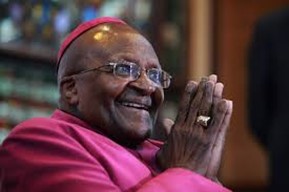
Archbishop Desmond Tutu, who died on December 26, believed in and actively lived the South African principle of ubuntu. The word ubuntu is part of the Zulu phrase “Umuntu ngumuntu ngabantu” which literally means, “A person is a person through other people.”
In The Book of Joy, which the Archbishop wrote with the Dalai Lama and Douglas Abrams, he said: “Ubuntu says when I have a small piece of bread, it is for my benefit that I share it with you.… In a very real sense we’re meant for a very profound complementarity. It is the nature of things. You don’t have to be a believer in anything. I mean, I could not speak as I am speaking without having learned it from other human beings…. I learned to be a human being from other human beings. We belong in this delicate network. I am, because you are. It is actually quite profound.… We are bound up and can be human only together.”
At Samaritan, we are deeply aware of how foundational it is to wellbeing to have reliable, caring relationships with others. Mind, body, spirit, and relationship are bound up together, and healing occurs as we give attention to each of these elements of our humanity and actively seek to integrate them. We are grateful for the example of those, like Desmond Tutu, who have faced adversity without losing their ability to identify with others and live, not in separation but in solidarity with them.
As the pandemic has stretched now from months to years, we all have experienced the significant, sometimes catastrophic impact that it has had on relationships. Stress that arises from multiple directions can drain away the ability to connect with one another in meaningful ways. It affects everyone, parents and their children, husbands and wives, friends, work colleagues, and casual acquaintances. Reaching out to one another in nurturing ways is sometimes simply more than we can do. In the resulting isolation, our sense of the warmth of human connectedness – ubuntu – withers.
How are we to respond to the unchosen stress of this time and the fears that arise in our mind, our body, and our spirit? Ubuntu tells us that, as individuals and in community, we can choose to intentionally express to one another respect, dignity, reciprocity, compassion, and mutuality.
When we feel overwhelmed by circumstances, it’s hard to know what that would look like. What can just one person do? Mindfulness suggests that, first of all, we should simply pause, taking time to acknowledge what we’re thinking and feeling. As we’re able to accept and calm our anxiety, we will see the situation more clearly. We’ll see the possibilities, where we have some control or influence and how we can use that. We’re more able to let go of the things that are beyond our control.
As our minds become quiet, refraining from worrying and judging ourselves and others, we are able to respond to the problems in more creative and confident ways. We find that we can act with the energy and compassion of ubuntu, secure in the experience of our common humanity, our interconnectedness and our responsibility to one another.
